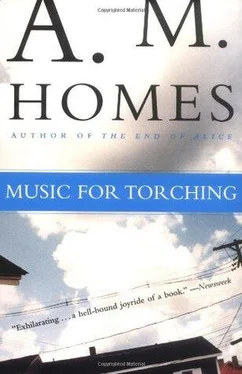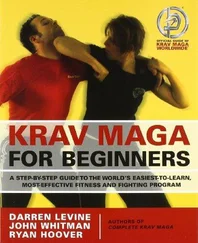"Are they up?"
"I hear water running," Paul says.
Sweat breaks out above Elaine's lip. She feels thin, wobbly, dehydrated.
"Are you all right?" he asks.
She was sick in the night. For two hours, she sat in the bathroom, wondering which end would erupt first, hoping not both at the same time. Paul was good; he held her forehead, he brought her a cold washcloth and a drink of water. "What do you need?" he asked. "What can I do?"
"I felt poisoned," Elaine tells him this morning. "I think it was the hamburger."
"Who brought the hamburger?"
"Joan," she says. Elaine can't decide whether or not to mention it to Joan when she calls to thank her for the grill. Would it be impolite to ask, Was anyone in your house sick last night?
"Don't tell her," Paul says, reading Elaine's mind. "You're the only one who got sick; the rest of us are fine. I doubt she was trying to kill you."
Elaine shakes her head. The idea that Joan was trying to kill her had never occurred to her.
Paul comes to the stove, he stands over her, watching her cook. "Don't let the fruit get gooey."
She slaps the spatula into his hand and walks away. "Flip 'em when the bubbles pop," she says, trying to maintain the momentum, the good cheer of a Monday morning. She sits at the kitchen table and puts her head between her legs.
She sees Sammy's shoes first-red sneakers. "Good morning," she says. "Did you sleep well?" "The alarm scared me," Sammy whines. "Why can't you wake me up?"
"It's your job to wake yourself up, you're a big boy now," Elaine says, talking into her knees.
"Two pancakes or three?" Paul asks him.
"Three," Sammy says.
"Why are you bent over?" Daniel quizzes as he walks in-black Nikes in the lead.
"Just taking a moment," Elaine says, lifting her head.
Paul is at the stove. He has tucked a dish towel under his chin in an effort to keep himself clean. He is serving the children first and then himself. "Can I get you anything?" he asks Elaine. "A pancake? Some toast?"
"You're burning the pan," Elaine says, seeing smoke rise from the stove. "Turn the fire down."
"Is there any caviar?" Daniel asks. "Caviar is good on pancakes, right? Isn't that how it's served, on little pancakes?"
"Blinis," Paul says. "The little pancakes are called blinis."
"It's not a breakfast food," Elaine says. "You should never ask for caviar-it's rude. Always wait until it's offered, and then just take a little bit. It's not something to be piggish about. It's a delicacy."
"I thought fish was good for you-brain food. Willy's sister eats a can of tuna every morning, and she gets straight A's." Daniel rolls up a pancake like a tortilla and stuffs it into his mouth.
"Use a fork," Elaine says.
"Pass the syrup," Paul says. They eat as though they have always eaten breakfast at the table together, as though it's nothing out of the ordinary. There is no rebellion, no threat of a coup or a sick-out; no one is demanding Pop-Tarts in bed.
"It's so bright in here I almost need sunglasses," Daniel says.
"It's shiny," Sammy says, sweeping a pancake through a slick of syrup.
"It's a bright and shiny day," Elaine says. "A perfect day, inside and out."
The workers arrive. They strap on their tool belts at the curb and let their hammers dangle. They come carrying cups of coffee and bags from Dunkin' Donuts. Elaine hears them outside talking about lumber, talking about what they did on Saturday night-bowling, movies, dinner at a sister's house, kids. She likes the sound of their voices, she likes listening in.
"Are we going to live here forever?" Sammy asks.
No one knows what to say-what's forever?
"We're not planning on going anywhere," Elaine says.
"Why?" Paul asks.
"Nate's moving."
"Really?" Paul says. Where is Mrs. Apple going? Will he go with her? And why is he the last to find out? "Where?" Paul asks.
"Somewhere," Sammy says.
"Exactly where is somewhere?" Paul leans in; he wants to shake Sammy until the words fall out of his mouth, exact quotes. "How do you know that Nate is moving?" he asks. His intensity is a giveaway.
Sammy shrugs. "I made it up," he confesses.
"You made it up? Why? Why would you do that?"
Sammy shrugs again. Dipping his finger in syrup, he licks it.
Elaine watches this display, she watches Paul. "Too bad," she says.
The phone rings. Elaine picks up.
"Good morning, Elaine, it's Bud Johnson calling from wood- shop. I just wanted to see how you're doing." "Can I call you back in about twenty minutes?" Elaine asks.
She is annoyed. She's annoyed with Paul and Sammy and whatever this weird game is about Nate's family. She's annoyed with Bud-where was he on Saturday when she needed him? To hell with all of you is what she feels like saying.
"Who was that?" Paul quizzes.
"What do you care who?"
"Why don't you want to tell me? Why don't you just say who it was-is it a secret?"
"No, Paul, it's not a secret. Do you have a secret?" She waits. "Am I allowed a life of my own? You certainly have one. I don't quiz you about who you talk to at the office, do I? Consider this house my office," she says.
"So that was a work-related call?"
Elaine nods.
"Contractor?"
"Yes," she says.
"I don't think so," he says. "The contractor is right outside. I saw him go by a minute ago."
Elaine doesn't respond.
"Architect?"
Sammy spills his milk; a white flood spreads across the table, soaking the place mats, running over the edge onto the floor. "Sorry," he says.
Paul and Elaine have done it again. They have done exactly what they don't want to do, reverted to their standard behavior-acting like jerks. The kid had to spill his milk to create a distraction.
"Don't worry," Elaine tells Sammy. "It's not your fault. It was a bad glass."
"Bad glass," Paul says, mocking her.
"Is everyone finished?" Elaine asks. "Are we all done?"
"Just tell me who that was," Paul says.
"No," she says, clearing the table.
"I can't believe you're being like this-it's so unlike you."
"Thank God I'm being unlike myself," she says. "There's hope yet." She turns her back to him and does the dishes.
"Okay, I'm an ass," Paul says on his way out. "That's the truth. The pancakes were great, Elaine. Really good." He pulls the dish towel out from under his chin. "Come on, guys," he says to the boys. "I'll drop you on my way. Do you have your stuff?" The boys cram things into their knapsacks. "Wasn't that a good breakfast? Didn't Mommy do a good job?"
"Fuck off," Elaine hisses.
Sammy burps.
Kissing the children good-bye, sending them out into the world with a peck and a pat, Elaine is learning how it's done. "Goodbye," she says, "good-bye, good-bye," closing the door behind them, quickly.
"Feel better," Paul says through the glass. "I'll call you later."
Elaine is fighting a foul mood. Despite her morning flurry of activity, her insight, her determination to stay upbeat and positive, the smallest things bring her down. As soon as they are gone, she steps outside. She has taught herself a new trick: Whenever she starts to sink, to get caught in a whirl, she must do something different, anything, it doesn't matter what, as long as it's active. She steps out of the house; the world opens in front of her. She stands on the kitchen steps, breathing deeply. Elaine wants so badly for everything to be good that she doesn't care how awful she really feels.
The workman with the crushed fingers waves when he sees her. His fingers, taped together with white adhesive, cut through the air, like a flag of surrender. "You were right," he says. "They were broken. Shows you what a hammer can do when you really swing it."
Inside, the phone rings.
"Your mother told me to call," her father says.
Читать дальше












